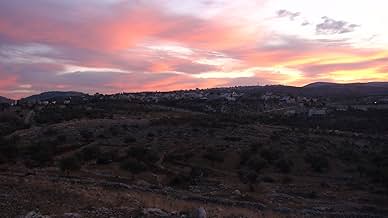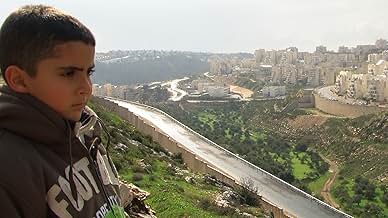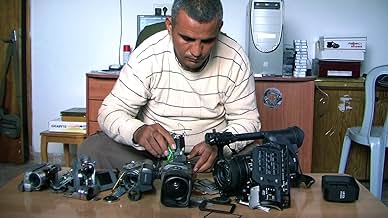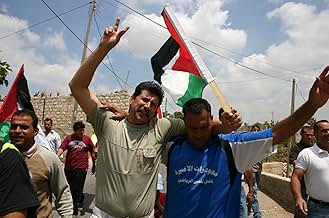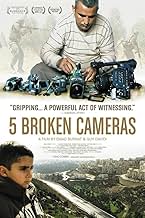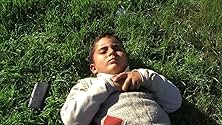AVALIAÇÃO DA IMDb
7,9/10
7 mil
SUA AVALIAÇÃO
Adicionar um enredo no seu idiomaA documentary on a Palestinian farmer's chronicle of his nonviolent resistance to the actions of the Israeli army.A documentary on a Palestinian farmer's chronicle of his nonviolent resistance to the actions of the Israeli army.A documentary on a Palestinian farmer's chronicle of his nonviolent resistance to the actions of the Israeli army.
- Indicado a 1 Oscar
- 18 vitórias e 10 indicações no total
Bassem Abu-Rahma
- Self - Protester
- (as Phil)
Ashraf Abu-Rahma
- Self - Protester
- (as Daba)
Avaliações em destaque
Five Broken Cameras is one of those pleasant surprises that you encounter as a movie buff. A homegrown low budget documentary that has you wondering right from the start. The title in and of itself had me curious, and helped pull me in - is this guy some camera shop mechanic or what? Who entitles their documentary after broken cameras? Fortunately, that mystery is solved instantaneously when you find out the film maker's journey through a Palestinian's point of view about the erecting of Israeli wall. It's an eye opening experience to see the progression of the film maker, both in his journey to see the building of the wall either diminished or stopped and his experience as a film maker in capturing the whole experience of the Palestinian domestic way of life. As a North American we are often removed from the complexities of the mid east and most of us are too busy living our own lives to really get a taste of events there. We see it on CNN or read about events in the papers, but it is rare to see such a gem of a documentary that really provides a domestic, gritty look at daily existence on the west bank. If you are a documentary lover, you will enjoy this movie, even if you are not - and just curious about Palestinian life - it's worth a look. I hope you enjoy the documentary - I know I did.
Take care Seebs
Take care Seebs
Emad Burnat's documentary about the on-the-ground reality for the people inside the West Bank is a very disturbing portrait of life under military occupation. In fact, when Burnat got detained at the LA airport on his way to the Academy Awards, he noted that it is what the Palestinians go through on a daily basis. Indeed, the settlers and army do some absolutely evil things, such as burning an olive tree.
"5 Broken Cameras" (whose title refers to the different cameras that Burnat had to use after the army kept breaking them) is a documentary that everyone should see. It's a real look at what life is like for the Palestinians under Israeli occupation, a complete contrast to the nonstop depictions of Palestinians as terrorists.
"5 Broken Cameras" (whose title refers to the different cameras that Burnat had to use after the army kept breaking them) is a documentary that everyone should see. It's a real look at what life is like for the Palestinians under Israeli occupation, a complete contrast to the nonstop depictions of Palestinians as terrorists.
In much of American culture, there is an invisible cultural pressure to be part of trends. These examples can be seen by the long lines whenever any new Apple product is released, by the people who run out to buy the latest designer clothing that is solely offered by Target, and by the what is means to be seen with Apple's white ear buds. Although there is a place and value for being part of the mainstream culture, each person carries with them a unique perspective into this world. And in the noise of all the marketing campaigns that try to target the greater population to adopt the next best product or service, it is becoming more difficult to be influenced by perspectives that are not mainstream but at the same time important in helping people see what it means to be human, in its challenges and struggles of life. Emad Burnat possesses a passion in capturing his Palestinian community in battling to retain their village land. His documentary 5 Broken Cameras brings about a view of his life that is rarely ever made conscious in the mainstream lives of the western world. One that gives us a glimpse of what it means to be part of the modern history of the Israeli-Palestinian conflict. Although many people have heard about the long withstanding history of Israeli-Palistenian conflict over the West Bank, the documentary brings about a quality of humanity to the conflict through a first person perspective of using non-violence protest strategies to prevent Israeli developer's from building onto the land of their village of Bil'in. Through six years worth of film, Emad is able to show a personable and affective-filled battle of many people in his village that risk their lives in protecting the land of their people. An important aspect that may often be lost to viewers of documentaries is that many of them are acting as a voice to those who have no voice. People of the western world are well-educated compared to the rest of the world and it is important that people learn to use their education and power to improve the lives of others. I have to admit that it is difficult in a world that constantly promotes the improvement of the individual and need to achieve individual success. There is an important significance that documentaries bring to the world. They pave a way for helping those with no voice gain attention and obtain a voice that is necessary. Emad has used his five broken cameras to give a voice to the village people of Bil'in and is helping people understand that not everyone in this world has stability even in the basic needs of food and shelter. Being able to see even this one perspective, is likely to help people realize that there are more important issues at hand in the world other than obtaining the latest gadget or wearing the latest fashion trend. It is therefore critical that people understand the power they possess living in the western world and how they can use it to give a voice to those who need help and do not have a voice.
It is rare to have something like this penetrate through the generally Zionist controlled media in the West. I am sure Zionists will try to label this film as "biased" and "one-sided," as usual in their intended distortion or paranoia. They might even start a campaign to lower its rating, as they normally do! But the facts and the images speak for themselves. Why is the world allowing the Israelis to get away with more land grabs and more injustice? The only reservation is that it does not explore fully the tragedy of what has been done to the Palestinians by Zionist colonization. This is not a special case. It is also similar to what happened in 1948 when almost 80% of Palestine was taken over, and the population in many cities and villages expelled and made into refugees. Hundreds of villages were ethnically cleansed, and several of them today have Israeli Jews living in the old houses owned by Palestinians (not having paid for them of course). It is almost like highway robbery. One film cannot do everything of course, but maybe it will encourages some people to dig more for the truth.
Retributive Justice...Oh How Sweet It Is !!
Today, Sunday, February 24, 2013, the Oscars will be hosting this first ever Oscar nominated Palestinian documentary, whose content, we all know full well, will never be shared with the estimated one billion worldwide viewing audience, nor will it ever be permitted to win.
Nevertheless, it just happens to fall on the Jewish Holiday of Purim, which commemorates the deliverance of the Jewish people in ancient Persia, in the wake of a plot by Haman. It is a story recorded in the Biblical Book of Esther. Understandably, this day of deliverance has become a day of Jewish feasting and rejoicing. It is celebrated by the giving of mutual gifts of food and drink, the offering of charity to the poor, the consumption of a celebratory meal, and in addition to the prayers and the grace after the meals, there is often a public recitation of the Scroll of Esther. Other customs include the drinking of wine, the wearing of masks and costumes, as well as the exuberant display of celebrations in public. Like Hanukkah, Purim has more of a 'national' (Israel) than a 'religious' (Judaic) character, and its status as a holiday is on a lesser stature than those days ordained by the Torah. Accordingly, business transactions (including the Oscars), and even manual labor are allowed on Purim.
As early as the 5th century, there was a custom to "BURN AN EFFIGY" of Haman on Purim.
However, the first religious ceremony ordained in the celebration of Purim, is the reading of the Book of Esther (Megillah) in Synagogues. The Megillah is read with a scintillation (a traditional chant) differing from that used in the customary reading of the Torah. When Haman's name is read out during the public chanting of the Megillah in the Synagogues, which by the way occurs 54 times, the congregation engages in boisterous noise-making to "BLOT OUT THE NAME".
Over time, a custom developed of writing the name of Haman on two smooth stones, thereafter knocking them together until the name was blotted out. Others write the name of Haman on the soles of their shoes, and then at the mention of the name, loudly and repeatedly stomp their feet as a sign of contempt. Most though, employ the use a loud and noisy ratchet, called a ra'ashan, or in Yiddish a grager. Although some rabbis have protested against these uproarious excesses (raucous stomping and deafening ratcheting), considering them to be a disturbance of public worship, nevertheless, these two customs in particular, have continued to be universally carried out in almost all Synagogues on Purim.
Just a thought ?!
I wonder if during the Oscars, the Zionists of Hollywood plan to conduct an 'L.A. Festival of Burning', wherein all copies of the "Un-Israeli" film '5 Broken Cameras' will be incinerated, not unlike that conducted by the Nazis in May of 1933, during which upwards of 25,000 volumes of "Un-German" books (predominantly Jewish) were burned ?!
Or worse yet, publicly humiliate themselves during the announcement of the film's nomination for an Oscar award, by stomping their feet and twirling permitted Ra'ashans, in a feeble attempt to 'Blot It Out'?!
After all, just the other day, they did attempt to prevent the film-maker Emad Burnat, together with his wife and 8 year old son, from attending, by way of harassment and intimidation at the hands of Immigration Officials at L.A.X.
Perhaps, it was because a 'Film' or even a 'Broken Camera' in the hands of a Palestinian now constitutes a potential 'Terrorist Threat' ?!
Today, Sunday, February 24, 2013, the Oscars will be hosting this first ever Oscar nominated Palestinian documentary, whose content, we all know full well, will never be shared with the estimated one billion worldwide viewing audience, nor will it ever be permitted to win.
Nevertheless, it just happens to fall on the Jewish Holiday of Purim, which commemorates the deliverance of the Jewish people in ancient Persia, in the wake of a plot by Haman. It is a story recorded in the Biblical Book of Esther. Understandably, this day of deliverance has become a day of Jewish feasting and rejoicing. It is celebrated by the giving of mutual gifts of food and drink, the offering of charity to the poor, the consumption of a celebratory meal, and in addition to the prayers and the grace after the meals, there is often a public recitation of the Scroll of Esther. Other customs include the drinking of wine, the wearing of masks and costumes, as well as the exuberant display of celebrations in public. Like Hanukkah, Purim has more of a 'national' (Israel) than a 'religious' (Judaic) character, and its status as a holiday is on a lesser stature than those days ordained by the Torah. Accordingly, business transactions (including the Oscars), and even manual labor are allowed on Purim.
As early as the 5th century, there was a custom to "BURN AN EFFIGY" of Haman on Purim.
However, the first religious ceremony ordained in the celebration of Purim, is the reading of the Book of Esther (Megillah) in Synagogues. The Megillah is read with a scintillation (a traditional chant) differing from that used in the customary reading of the Torah. When Haman's name is read out during the public chanting of the Megillah in the Synagogues, which by the way occurs 54 times, the congregation engages in boisterous noise-making to "BLOT OUT THE NAME".
Over time, a custom developed of writing the name of Haman on two smooth stones, thereafter knocking them together until the name was blotted out. Others write the name of Haman on the soles of their shoes, and then at the mention of the name, loudly and repeatedly stomp their feet as a sign of contempt. Most though, employ the use a loud and noisy ratchet, called a ra'ashan, or in Yiddish a grager. Although some rabbis have protested against these uproarious excesses (raucous stomping and deafening ratcheting), considering them to be a disturbance of public worship, nevertheless, these two customs in particular, have continued to be universally carried out in almost all Synagogues on Purim.
Just a thought ?!
I wonder if during the Oscars, the Zionists of Hollywood plan to conduct an 'L.A. Festival of Burning', wherein all copies of the "Un-Israeli" film '5 Broken Cameras' will be incinerated, not unlike that conducted by the Nazis in May of 1933, during which upwards of 25,000 volumes of "Un-German" books (predominantly Jewish) were burned ?!
Or worse yet, publicly humiliate themselves during the announcement of the film's nomination for an Oscar award, by stomping their feet and twirling permitted Ra'ashans, in a feeble attempt to 'Blot It Out'?!
After all, just the other day, they did attempt to prevent the film-maker Emad Burnat, together with his wife and 8 year old son, from attending, by way of harassment and intimidation at the hands of Immigration Officials at L.A.X.
Perhaps, it was because a 'Film' or even a 'Broken Camera' in the hands of a Palestinian now constitutes a potential 'Terrorist Threat' ?!
Você sabia?
- CuriosidadesEmad Burnat is the first Palestinian nominated for the Academy Award for Best Documentary Feature.
- Citações
Emad Burnat - Narrator: Healing is a challenge in life. It's a victim sole obligation. By healing, you resist oppression. But when I'm hurt over and over again, I forget the wounds that rule my life. Forgotten wounds can't be healed. So I film to heal. I know they may knock at my door at any moment. But I'll just keep filming. It helps me confront life. And survive.
- ConexõesEdited into P.O.V.: 5 Broken Cameras (2013)
- Trilhas sonorasMusic from the albums: Randana, Majâz, As far
Music composed and performed by Samir Joubran, Wissam Joubran, Adnan Joubran
Interpreted by Le Trio Joubran
Percussions by Yousef Hbeisch
(p) & (c) Randana - 2007
Courtesy of Randana
Principais escolhas
Faça login para avaliar e ver a lista de recomendações personalizadas
- How long is 5 Broken Cameras?Fornecido pela Alexa
Detalhes
- Data de lançamento
- Países de origem
- Centrais de atendimento oficiais
- Idiomas
- Também conhecido como
- 5 Broken Cameras
- Locações de filme
- Empresas de produção
- Consulte mais créditos da empresa na IMDbPro
Bilheteria
- Faturamento bruto nos EUA e Canadá
- US$ 109.983
- Fim de semana de estreia nos EUA e Canadá
- US$ 6.674
- 3 de jun. de 2012
- Faturamento bruto mundial
- US$ 146.475
- Tempo de duração1 hora 34 minutos
- Cor
- Mixagem de som
- Proporção
- 1.78 : 1
Contribua para esta página
Sugerir uma alteração ou adicionar conteúdo ausente

Principal brecha
By what name was Cinco Câmeras Quebradas (2011) officially released in India in English?
Responda

